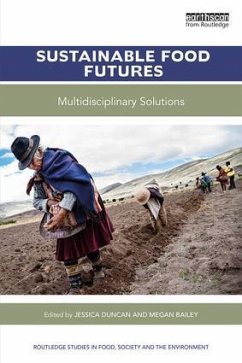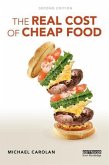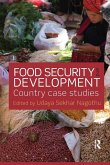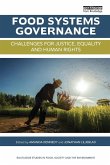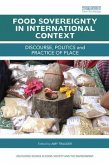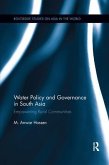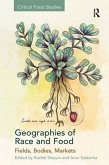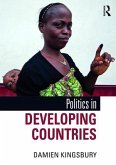Sustainable Food Futures
Multidisciplinary Solutions
Herausgeber: Duncan, Jessica; Bailey, Megan
Sustainable Food Futures
Multidisciplinary Solutions
Herausgeber: Duncan, Jessica; Bailey, Megan
- Broschiertes Buch
- Merkliste
- Auf die Merkliste
- Bewerten Bewerten
- Teilen
- Produkt teilen
- Produkterinnerung
- Produkterinnerung
This bookseeks to resolve the disconnections in research and governanceby breaking down interdisciplinary barriers to develop innovatory food security solutions.
Andere Kunden interessierten sich auch für
![The Real Cost of Cheap Food The Real Cost of Cheap Food]() Michael CarolanThe Real Cost of Cheap Food61,99 €
Michael CarolanThe Real Cost of Cheap Food61,99 €![Food Security and Development Food Security and Development]() Food Security and Development74,99 €
Food Security and Development74,99 €![Food Systems Governance Food Systems Governance]() Food Systems Governance65,99 €
Food Systems Governance65,99 €![Food Sovereignty in International Context Food Sovereignty in International Context]() Food Sovereignty in International Context65,99 €
Food Sovereignty in International Context65,99 €![Water Policy and Governance in South Asia Water Policy and Governance in South Asia]() M Anwar HossenWater Policy and Governance in South Asia65,99 €
M Anwar HossenWater Policy and Governance in South Asia65,99 €![Geographies of Race and Food Geographies of Race and Food]() Geographies of Race and Food78,99 €
Geographies of Race and Food78,99 €![Politics in Developing Countries Politics in Developing Countries]() Damien KingsburyPolitics in Developing Countries57,99 €
Damien KingsburyPolitics in Developing Countries57,99 €-
-
-
This bookseeks to resolve the disconnections in research and governanceby breaking down interdisciplinary barriers to develop innovatory food security solutions.
Hinweis: Dieser Artikel kann nur an eine deutsche Lieferadresse ausgeliefert werden.
Hinweis: Dieser Artikel kann nur an eine deutsche Lieferadresse ausgeliefert werden.
Produktdetails
- Produktdetails
- Verlag: Taylor & Francis
- Seitenzahl: 238
- Erscheinungstermin: 1. Oktober 2017
- Englisch
- Abmessung: 231mm x 155mm x 13mm
- Gewicht: 340g
- ISBN-13: 9781138207004
- ISBN-10: 1138207004
- Artikelnr.: 48706258
- Herstellerkennzeichnung
- Libri GmbH
- Europaallee 1
- 36244 Bad Hersfeld
- gpsr@libri.de
- Verlag: Taylor & Francis
- Seitenzahl: 238
- Erscheinungstermin: 1. Oktober 2017
- Englisch
- Abmessung: 231mm x 155mm x 13mm
- Gewicht: 340g
- ISBN-13: 9781138207004
- ISBN-10: 1138207004
- Artikelnr.: 48706258
- Herstellerkennzeichnung
- Libri GmbH
- Europaallee 1
- 36244 Bad Hersfeld
- gpsr@libri.de
Jessica Duncan is an Assistant Professor in the Rural Sociology Group, Wageningen University, the Netherlands. She is the author of Global Food Security Governance: Civil society engagement in the reformed Committee on World Food Security (Routledge, 2015). Megan Bailey is an Assistant Professor in the Marine Affairs Program and Canada Research Chair, Integrated Ocean and Coastal Governance, Dalhousie University, Canada.
1. Sustainable Food Futures: Multidisciplinary solutions Part I:
Recognizing Place 2.Cultural Relevance in Arctic food Security Initiatives
3.Rebuilding Consumers' Trust in Food: Community Supported Agriculture in
China 4.Place-based food systems: "re-valuing local" and fostering
socio-ecological sustainability 5.Recovering Farmland Commons Part II:
Enhancing Participation 6.The Political Economy of Customary Land Rights in
Mozambique: Lessons from a Food Sovereignty Movement 7.Small-scale
aquaculture in the Bolivian Amazon: A contextually-based solution for
positive social and economic outcomes 8.Building 'A World Where Many Worlds
Fit': Indigenous Autonomy, Mutual Aid, and an (Anti-Capitalist) Moral
Economy of the (Rebel) Peasant Part III: Challenging Markets 9.Knowing how
to bring food to the market: appreciating the contribution of intermediary
traders to the future of food availability in Sub-Saharan Africa 10.Certify
sustainable retailers? 11.The solution cannot be conventionalized:
Protecting the alterity of fairer and more sustainable food networks Part
IV: Designing sustainable food futures 12.Cultured meat, better than beans?
13.Soil Currency: Exploring a more equitable, sustainable, and
participatory economic system 14.From pirate islands to communities of
hope: Reflections on the circular economy of food systems Part V:
Conclusions 15.Caution: Road work ahead
Recognizing Place 2.Cultural Relevance in Arctic food Security Initiatives
3.Rebuilding Consumers' Trust in Food: Community Supported Agriculture in
China 4.Place-based food systems: "re-valuing local" and fostering
socio-ecological sustainability 5.Recovering Farmland Commons Part II:
Enhancing Participation 6.The Political Economy of Customary Land Rights in
Mozambique: Lessons from a Food Sovereignty Movement 7.Small-scale
aquaculture in the Bolivian Amazon: A contextually-based solution for
positive social and economic outcomes 8.Building 'A World Where Many Worlds
Fit': Indigenous Autonomy, Mutual Aid, and an (Anti-Capitalist) Moral
Economy of the (Rebel) Peasant Part III: Challenging Markets 9.Knowing how
to bring food to the market: appreciating the contribution of intermediary
traders to the future of food availability in Sub-Saharan Africa 10.Certify
sustainable retailers? 11.The solution cannot be conventionalized:
Protecting the alterity of fairer and more sustainable food networks Part
IV: Designing sustainable food futures 12.Cultured meat, better than beans?
13.Soil Currency: Exploring a more equitable, sustainable, and
participatory economic system 14.From pirate islands to communities of
hope: Reflections on the circular economy of food systems Part V:
Conclusions 15.Caution: Road work ahead
1. Sustainable Food Futures: Multidisciplinary solutions Part I:
Recognizing Place 2.Cultural Relevance in Arctic food Security Initiatives
3.Rebuilding Consumers' Trust in Food: Community Supported Agriculture in
China 4.Place-based food systems: "re-valuing local" and fostering
socio-ecological sustainability 5.Recovering Farmland Commons Part II:
Enhancing Participation 6.The Political Economy of Customary Land Rights in
Mozambique: Lessons from a Food Sovereignty Movement 7.Small-scale
aquaculture in the Bolivian Amazon: A contextually-based solution for
positive social and economic outcomes 8.Building 'A World Where Many Worlds
Fit': Indigenous Autonomy, Mutual Aid, and an (Anti-Capitalist) Moral
Economy of the (Rebel) Peasant Part III: Challenging Markets 9.Knowing how
to bring food to the market: appreciating the contribution of intermediary
traders to the future of food availability in Sub-Saharan Africa 10.Certify
sustainable retailers? 11.The solution cannot be conventionalized:
Protecting the alterity of fairer and more sustainable food networks Part
IV: Designing sustainable food futures 12.Cultured meat, better than beans?
13.Soil Currency: Exploring a more equitable, sustainable, and
participatory economic system 14.From pirate islands to communities of
hope: Reflections on the circular economy of food systems Part V:
Conclusions 15.Caution: Road work ahead
Recognizing Place 2.Cultural Relevance in Arctic food Security Initiatives
3.Rebuilding Consumers' Trust in Food: Community Supported Agriculture in
China 4.Place-based food systems: "re-valuing local" and fostering
socio-ecological sustainability 5.Recovering Farmland Commons Part II:
Enhancing Participation 6.The Political Economy of Customary Land Rights in
Mozambique: Lessons from a Food Sovereignty Movement 7.Small-scale
aquaculture in the Bolivian Amazon: A contextually-based solution for
positive social and economic outcomes 8.Building 'A World Where Many Worlds
Fit': Indigenous Autonomy, Mutual Aid, and an (Anti-Capitalist) Moral
Economy of the (Rebel) Peasant Part III: Challenging Markets 9.Knowing how
to bring food to the market: appreciating the contribution of intermediary
traders to the future of food availability in Sub-Saharan Africa 10.Certify
sustainable retailers? 11.The solution cannot be conventionalized:
Protecting the alterity of fairer and more sustainable food networks Part
IV: Designing sustainable food futures 12.Cultured meat, better than beans?
13.Soil Currency: Exploring a more equitable, sustainable, and
participatory economic system 14.From pirate islands to communities of
hope: Reflections on the circular economy of food systems Part V:
Conclusions 15.Caution: Road work ahead

